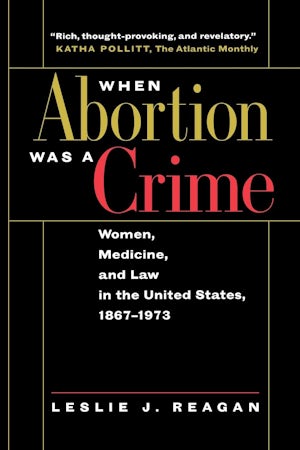
As we approach the thirtieth anniversary of Roe v. Wade, it's crucial to look back to the time when abortion was illegal. Leslie J. Reagan traces the practice and policing of abortion, which... Read More

- Frank Rich,, New York Times"Essential."
- Rickie Solinger,, The San Francisco Chronicle"A brilliant account of the era before the 1973 Roe vs. Wade Supreme Court decision. . . .A model of social history, supported by a spectacular wealth of documentary evidence. . . .This well-written book is a stellar, complex, and accessible volume that will stand as the definitive history for years to come."
- Katha Pollitt,, The Atlantic"The first to span the whole period of criminalization and to cover the subject in such depth. . . .Important and original, vigorously written. . . .Rich, thought-provoking, and revelatory."
- Jane Hodgson,, Journal of the American Medical Association"Reagan brings a new perspective to the history of illegal abortion in the late 19th and early 20th centuries."
- Thomas Szasz,, The Washington Post"A first-rate exposition of the changing cultural and legal climate regarding abortion in America."
- Publishers Weekly"For those who take abortion for granted, Reagan's work is an eye-opener."
– Frank Rich,, New York Times"Essential."
– Rickie Solinger,, The San Francisco Chronicle"A brilliant account of the era before the 1973 Roe vs. Wade Supreme Court decision. . . .A model of social history, supported by a spectacular wealth of documentary evidence. . . .This well-written book is a stellar, complex, and accessible volume that will stand as the definitive history for years to come."
– Katha Pollitt,, The Atlantic"The first to span the whole period of criminalization and to cover the subject in such depth. . . .Important and original, vigorously written. . . .Rich, thought-provoking, and revelatory."
– Jane Hodgson,, Journal of the American Medical Association"Reagan brings a new perspective to the history of illegal abortion in the late 19th and early 20th centuries."
– Thomas Szasz,, The Washington Post"A first-rate exposition of the changing cultural and legal climate regarding abortion in America."
– Publishers Weekly"For those who take abortion for granted, Reagan's work is an eye-opener."